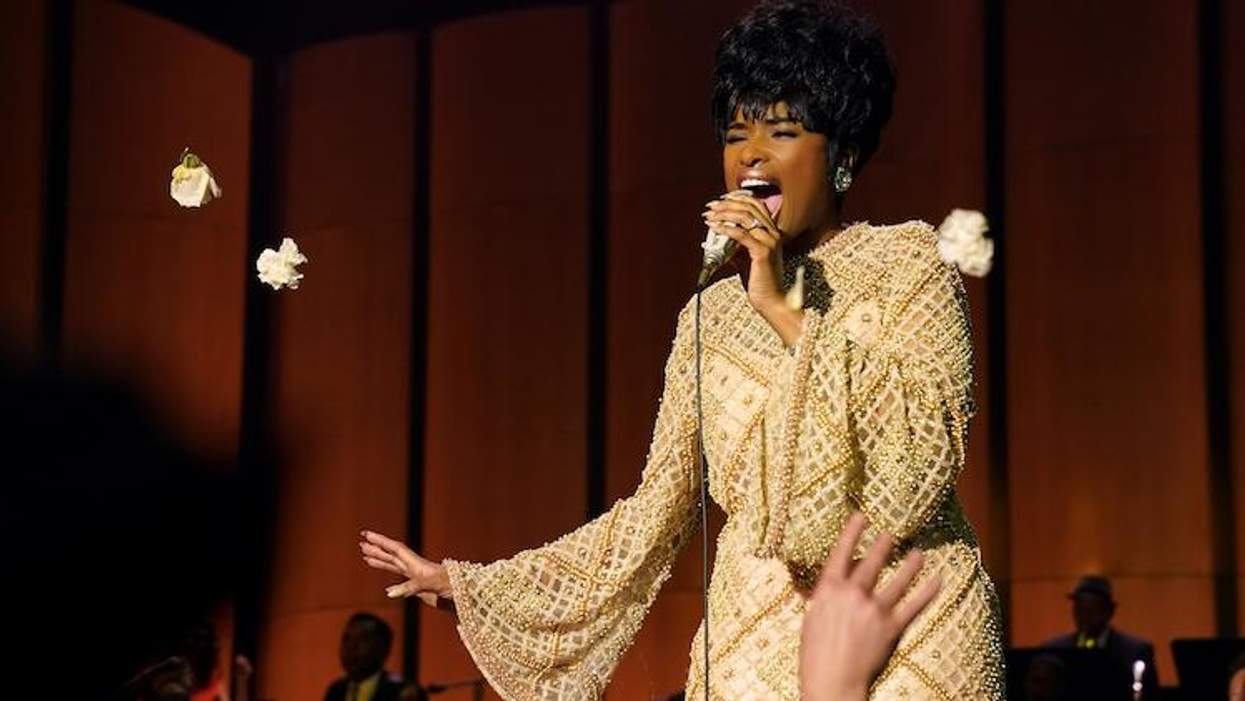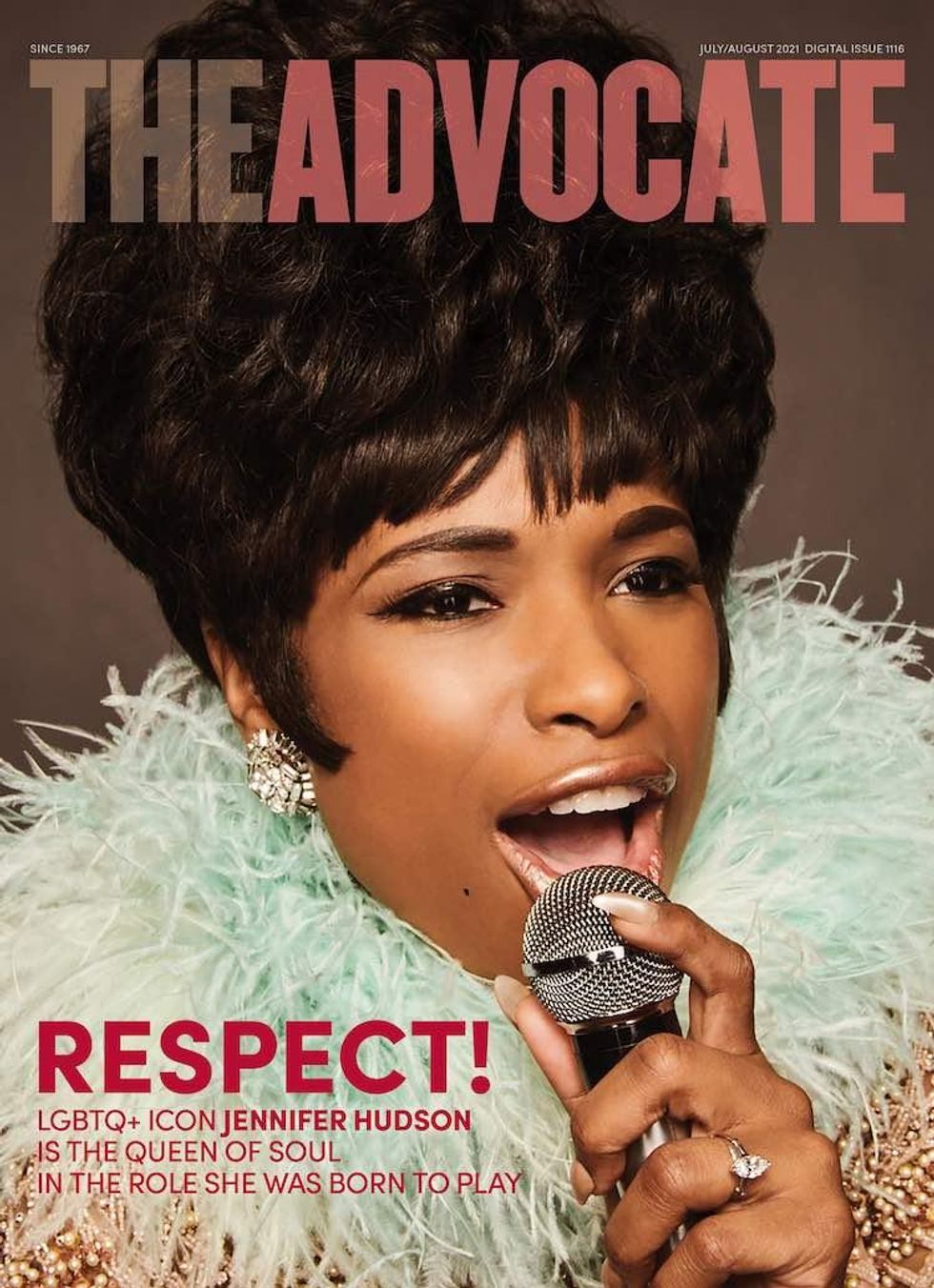There's a scene in the big-screen biopic Respect where Jennifer Hudson's Aretha Franklin takes control in the studio, putting her artistic vision on her sister Carolyn Franklin's tune "Ain't No Way." To that point, in the film at least, Aretha has navigated her rise to stardom, beginning on the gospel circuit, with the help of and despite some imposing male figures in her life -- her father, the Reverend C.L. Franklin (Forest Whitaker), and her controlling husband/manager, Ted White (Marlon Wayans).

Seated at the piano, Hudson, preordained to play the Queen of Soul after Aretha saw her Oscar-winning Dreamgirls turn, gently amps up Aretha's confidence to take control of the song's direction. It's a turning point in the film where "Respect" becomes more than a song title and something Aretha realizes she has the power to command. The scene is also, not incidentally, a nod to Franklin (and Hudson) as LGBTQ+ icons considering Carolyn Franklin was a lesbian and it's widely assumed the song was intended for a woman -- a stealth queer anthem, as it were.
A big fan of the song, Hudson says knew she had to sing it in the film. For director Liesl Tommy and writer Tracey Scott Wilson, there was great intention in the inclusion of the song first widely proposed to be an "undercover LGBT anthem" by writer Andrew Martone on The 97 in 2018.

Jennifer Hudson as Aretha Franklin at the piano
"Prior to working on the film, I didn't know Carolyn was a lesbian," Wilson says. "I found her incredibly inspiring, and I wish I had known that when I was growing up. To know that she lived openly at a time when it was so difficult would have meant everything to my baby dyke self. It was very important to Liesl and I that Carolyn's genius and influence on Aretha be part of the story. I think one reason 'Ain't No Way' is such a powerful classic is because Carolyn was speaking her truth in that song, and I hope seeing the creation of it inspires others to do the same."
"'Ain't No Way' is my favorite Aretha song. And knowing what that song means to those in the know and how it represents Aretha's support for Carolyn -- its presence in the film was unquestionable," says Tommy, a renowned director of plays, including Appropriate and Eclipsed. "It is one of my favorite scenes in the film. I love the joy Carolyn expresses at hearing her sisters pour themselves into performing her song. She feels seen and heard. I hope those understanding Carolyn's story also feel seen, heard, and loved."
Respect follows Franklin's rise from belting in the church through some of her greatest hits, including "Respect," and ends with the making of her visionary 1972 gospel record Amazing Grace, which she insisted she produce (that live album won a Grammy and sold 2 million copies). Through flashbacks, Respect depicts Franklin's childhood in the church (Skye Dakota Turner plays young Aretha) and happier days before the family lost their mother, Barbara Franklin (Audra McDonald). The film also delves into Aretha's work with Dr. Martin Luther King Jr. and her social justice activism.

Hudson and Forest Whitaker
"That's part of the power in the arc of the story because it starts out where she's being guided and told what to do. And eventually, she has to find her way out of that. As we all know, you have to earn your respect," Hudson says of the film's narrative journey. "I feel as though she did that, coming into her own, coming out of everything she did, she was able to rise above and come out of it."
There's plenty of joy in Respect, like watching Hudson perform the Franklin songbook she's been known to do since she landed on the collective radar during American Idol's third season in 2004. But there are moments that peel back the fame to reveal Franklin struggling, battling with her husband, and coping with substance abuse along the way.
A particularly moving scene late in the film carried extra meaning for Hudson, whose mother, brother, and nephew were shot and killed in Chicago in 2008. The scene occurs as Franklin (who died in 2018 of pancreatic cancer) has hit rock bottom with booze. She envisions her mother there to comfort her. Barbara Franklin sings "Amazing Grace" as she holds her now-grown daughter. In retrospect, Hudson says Aretha Franklin must have known the younger woman could carry the weight of her life story, given her own loss.
"It was filled with the spirit," Hudson says of the scene. "You've got Audra's character singing 'Amazing Grace' while Aretha is saying the Lord's Prayer, which was the base of who she is, where she came from. You feel the connection and the longing for her mother."

Hudson and Liesl Tommy
"It resonated with me because it reminded me of my own mother, and it helped me in that moment after we finished shooting the scene because it was so heavy. That's when it clicked with me, OK, maybe this is part of why she wanted me to play her."
Like Franklin, whose musical prowess and fearlessness rendered her an LGBTQ+ icon, Hudson has long had appeal for queer fans. Her love of her queer fans dovetails with wisdom handed down from her mother.
"I always say there's nothing better than to see others being blessed in your blessings," Hudson says. "My mother was always the advocate of being who you are, and I'm the same way. And I love for everyone, anyone, to be themselves to the fullest. I'm thinking of Aretha, I'm thinking of myself. I'm just glad that we could be a part of that."






































































Charlie Kirk DID say stoning gay people was the 'perfect law' — and these other heinous quotes